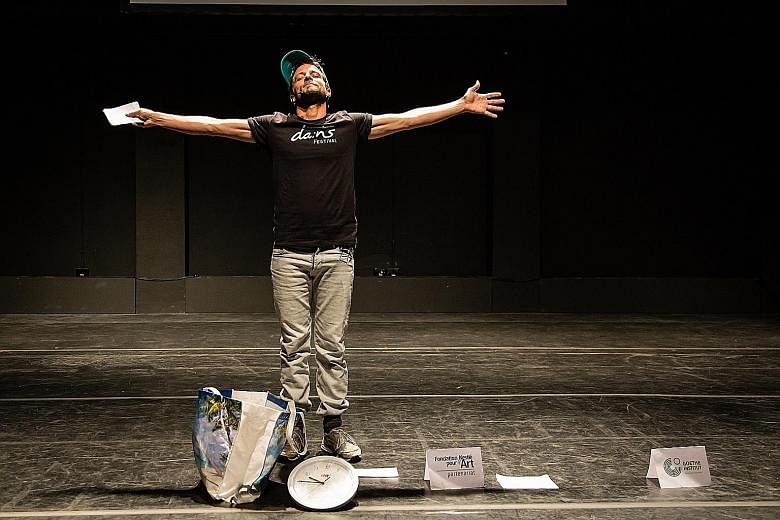REVIEW / DANCE
HALFBREADTECHNIQUE
Martin Schick
Annexe Studio - Esplanade Theatres on the Bay/Last Saturday
Swiss dance artist Martin Schick used a host of gimmicks and kitsch to cleverly expose the pretensions and agendas of the creative industry.
Less of a dance performance in the conventional sense and more of a performative commentary, Schick implicated himself, the audience and the organisations that supported him.
From corporate social responsibility to capitalism to the new economy, he took a dig at almost all the constituents that prop up the structure of the machine that runs the art and creative world.
Beginning with a candid, seemingly unrehearsed monologue, he gave full disclosure of the funds and organisations that enabled him to create and present Halfbreadtechnique.
In a plain and direct manner, the audience was told, for instance, that he received a specific amount of money and assistance from organisations such as the Fondation Nestle pour l'Art in Switzerland and the Goethe Institut.
Although the information was read off cue cards, one could not help but feel a sense of sarcasm from Schick, especially when, for the sake of transparency, he also announced that Nestle has been ranked among the top few unethical global corporations. It was an awkwardly delicious case of "did he just bite the hand that fed him?"
Things did not stop there. He went on to explain what his Halfbreadtechnique entailed: It was the idea of sharing half of what one had, but there was a catch.
In sharing, altruism towards the receiver was not the idea being foregrounded. Instead, it was the personal joy obtained by the one who initiated the sharing that was highlighted.
With this clever flipping of angles, he tainted the joy of sharing with a selfish intent - I share because I am concerned only about my good karma, not your well-being. Just like that, he exposed the hypocrisies of the current sharing economy.
It was not just sweeping statements that he was making. Things got real when he took out a wad of dollar notes. He started sharing half of his salary with willing audience members, who would occupy half the stage to dance.
Starting off by halving the full stage and then further halving the newly created halves, the problematic nature of what is usually deemed as a fair method of distribution became obvious as each newly created half got increasingly smaller.
The amount of money being shared was also halved in similar fashion. While the participants were dancing in their respective halves, Schick lazily told jokes and engaged in banter with the rest of the audience, proving that with a simple economic concept, another individual's volition could be teased out with just a little bit of money to do something. In this case, it was sharing in the effort of creating his dance work.
It seemed like they were sharing. But make no mistake, one person was still benefiting the most from it - the artist with the witty concept.
With the imbalanced result of his halving and sharing already being demonstrated in front of the audience, he continued to cheekily test the volatile mood by constantly hinting that he comes from a rich and stable country; that because he had so much, he would not mind sharing it with others.
The imbalances of First World and Developing World economic partnerships played out all too clearly here.
In Halfbreadtechnique, Schick scored with a work that used performance to talk about the problems and complications of the current socio-economic contracts in today's society. It was work that annoyed but, at the same time, made one laugh.
In truth, it was annoying because while watching, one realised that one could be both victim and perpetrator of the very concepts that he was highlighting.

